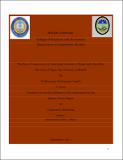| dc.description.abstract | This study presents analysis of the role of cooperatives in unlocking the potentials of disabled war veterans. Veterans are indeed interested to join themselves in a genuine synergy under cooperatives to solve their social and economic problems. The ultimate objective of this thesis was to assess and measure the overall role of cooperatives in unlocking potentials of the disabled veteran through cooperatives, and in attaining social and economical empowerment of people with disabilities. To find out the role of cooperatives in attaining sustainable livelihood of the veterans engaged in cooperatives, by the degree of physical, human, social, and financial capital they owned; To examine the role of cooperatives in improving the lifestyle, self image and attitude; To identify the challenges encountered by the disabled members of the cooperatives; To assess the compatibility of the cooperative units (activities) to people with disabilities and to suggest future directions for all-inclusive policy and interventions. Data was collected from primary & secondary sources through structured & unstructured personal interview, discussion and questionnaire; In-depth interview was used with 10 key informants. The researcher investigated the role of cooperatives in attaining sustainable livelihood of members with in-depth interview of 5 cooperative members. The population of the study had comprised 300 war veterans living with disability and are being found engaged in 20 different cooperative unites and therefore the whole population, which is 100% of the participants were target population of the study. The result of the study indicates that cooperatives brought both directly and indirectly a significant physical, psycho-social, and economic rehabilitation among the veteran by unlocking their potential. The compatibility of the cooperative units, the credit facility and infrastructure are found to be the major hindrances to the improvement of productivity of the veterans in cooperatives. More importantly cooperatives; helped the veterans to know more about themselves, that they are productive and have got the potential. The result of the study is presented in a simple table, cross tabulation and bar graph which indicates that cooperatives are the best means ever to unlock the potential of the disabled war veterans and lead them to productivity and independent living economically. Generally it is concluded that cooperatives offered a unique experience for the disabled war veterans to enhance their efforts at empowerment and to decrease their dependence on the state and on their association. | en_GB |


